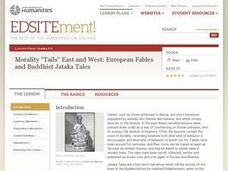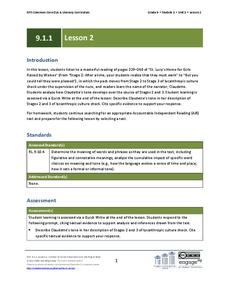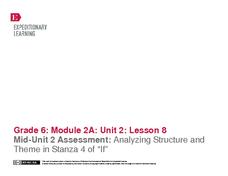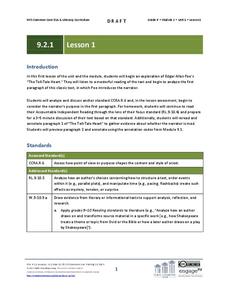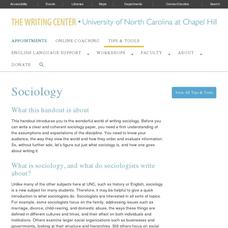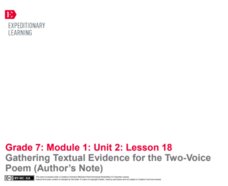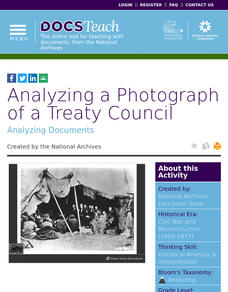Curated OER
Morality "Tails" East and West: European Fables and Buddhist Jataka Tales
Have your class explore Buddhist Jataka Tales to compare and contrast them to European fables. After defining fables, Jataka tales, and the elements of each, learners identify themes and patterns for both types of narratives and the...
Curated OER
Comparing Poems
Young literary analysts compare two poems by the same author. Readers look for slant rhyme, observe the beat and rhythm of each, and search for repeated vowel sounds. After re-reading, they observe the lack of punctuation and the stanza...
Curated OER
Intelligence in the Internet Age
Does technology affect our intelligence? Stefanie Olsen's article, "Intelligence in the Internet Age," and the thought provoking reading comprehension questions that follow, are sure to generate a lively discussion.
Virginia English Bulletin
Book Trailer Projects From Classroom to Community
Invite your pupils to express their understanding of a novel through a collaborative video project. Groups choose a novel from those you have studied in class, select four scenes, storyboard the scenes, film the scenes, edit the film,...
EngageNY
Grade 9 ELA Module 1, Unit 1, Lesson 10
As you work through a literary analysis unit based on Karen Russell's "St. Lucy's Home for Girls Raised by Wolves," use a writing assessment to measure your class's skills. They choose one epigraph from the story to analyze and track...
EngageNY
Grade 9 ELA Module 1, Unit 1, Lesson 2
How can you read a character's tone? What about a narrator's tone? Analyze Karen Russell's "St. Lucy's Home for Girls Raised by Wolves" with a lesson that focuses on how word choice can change tone and how tone can affect the development...
EngageNY
Analyzing Structure and Theme in Stanza 4 of “If”
Here is a lesson that provides scholars with two opportunities to stretch their compare-and-contrast muscles. First, learners compare and contrast their experience reading the fourth stanza of If by Rudyard Kipling to listening to the...
EngageNY
Grade 10 ELA Module 1: Unit 3, Lesson 9
Having prepared for an analysis essay about one of the characters from The Joy Luck Club by Amy Tan, tenth graders demonstrate their understanding in a mid-unit assessment. They focus on either Jing-Mei or Waverly in an informative...
EngageNY
Grade 9 ELA Module 1, Unit 2, Lesson 2
Class members continue their analysis of Letters to a Young Poet, paying particular attention to how Rilke uses metaphor to develop his ideas about the source of inspiration.
EngageNY
Grade 9 ELA Module 2: Unit 1, Lesson 1
Once conceived, a guided set of literary analysis lessons will assist you day and night. Ninth graders look closely at "The Tell-Tale Heart" and analyze how Poe uses point of view to create questions about the narrator's sanity and...
EngageNY
Grade 9 ELA Module 2, Unit 2, Lesson 9
How can a prophecy be true if the future differs from what was foreseen? Sophocles entertains this question in Oedipus the King. Teiresias, Creon, and Oedipus have weighed in on the unsolved murder of Laius, and now Jocasta voices her...
EngageNY
Grade 9 ELA Module 2, Unit 2, Lesson 16
Was Oedipus' destiny determined by fate or by his actions? Using details from the text, ninth graders delve into a critical thinking exercise based on Sophocles' Oedipus the King. Now that Oedipus has learned his true identity, readers...
EngageNY
Grade 9 ELA Module 2, Unit 3, Lesson 12
As the first in a two-part, end-of-unit assessment that encourages readers to synthesize the unit's main ideas, class members review their notes for each of the three texts they read and develop three open-ended discussion questions...
Curriculum Corner
Fiction Graphic Organizers
Analyze a fictional text with a four-page packet that explores a story's main character and moral, challenges scholars to ask and answer questions about the text, and to create a story map.
University of North Carolina
Sociology
What exactly does sociology entail? Sociology is a broad field that covers many topics, including culture, mass media, and social movements. A helpful handout prepares scholars for typical writing found in college-level sociology...
EngageNY
Key Incidents Reveal Aspects of Character: Survival at Sea (Pages 114-168)
Learn from experience. As part of their study of Unbroken, scholars use a turn-and-talk strategy to discuss Louie's experiences and the presence of God while he is lost at sea. They then read quotes from the text and infer what the words...
EngageNY
Gathering Textual Evidence for the Two-Voice Poem (Author’s Note)
Writers take a look at how to gather evidence from the information text in the unit that connects to Salva and Nya’s story. They complete a Gathering Evidence from Informational Texts sheet to guide their work. Pupils then use the...
Great Books Foundation
I Shall Not Beg for My Rights
An excerpt from Henry MacNeal Turner's address to the Georgia legislature provides class members with an opportunity to develop their literary analysis skills. Prompted by the provided factual, evaluative, and interpretive questions,...
EngageNY
What Gives Stories Their Power?
Read to me! Scholars get lost in a picture book read aloud of The People Could Fly. They discuss text-dependent questions and talk with partners about the meaning of the story. They then study an image in the book to determine the power...
DocsTeach
Analyzing a Photograph of a Treaty Council
A photo catches a moment in time that provides a glimpse into the past. An interesting resource focuses on historical analysis using an image from a treaty council with Native Americans. Budding historians complete an online worksheet...
DocsTeach
Excerpts from the Declaration of Independence
What exactly did the Founding Fathers declare? Elementary historians delve into the Declaration of Independence in a fast-paced activity. The resource provides text experts and guided questions to help academics analyze the intent of the...
National Woman's History Museum
Women, Education, Sports, and Title IX
Title IX did more than change the face of sports in the United States. This landmark legislation also impacted women in education and politics. High schoolers examine the text of the legislation and the 2016 Senate resolution and watch...
EngageNY
Grade 10 ELA Module 1: Unit 3, Lesson 12
Relationships between characters generate energy that propels the plot and connects events with a central idea. Track character development and meaningful relationships with a literary analysis lesson focused on H.G. Bissinger's Friday...
National Park Service
Making Choices
What factors go into a decision to enter a war? Use a collection of primary source documents and images to prompt a discussion about the American Revolution and the reasons for entering a war against Britain.


